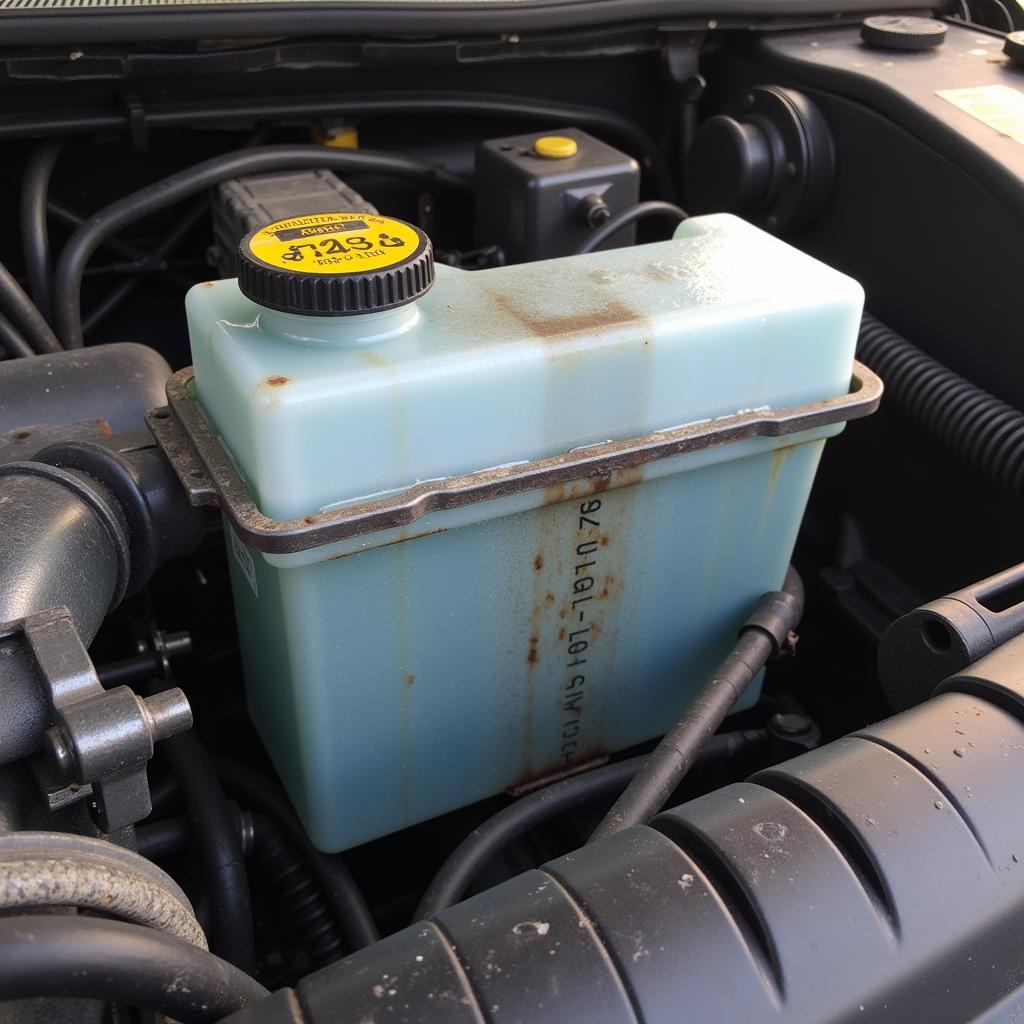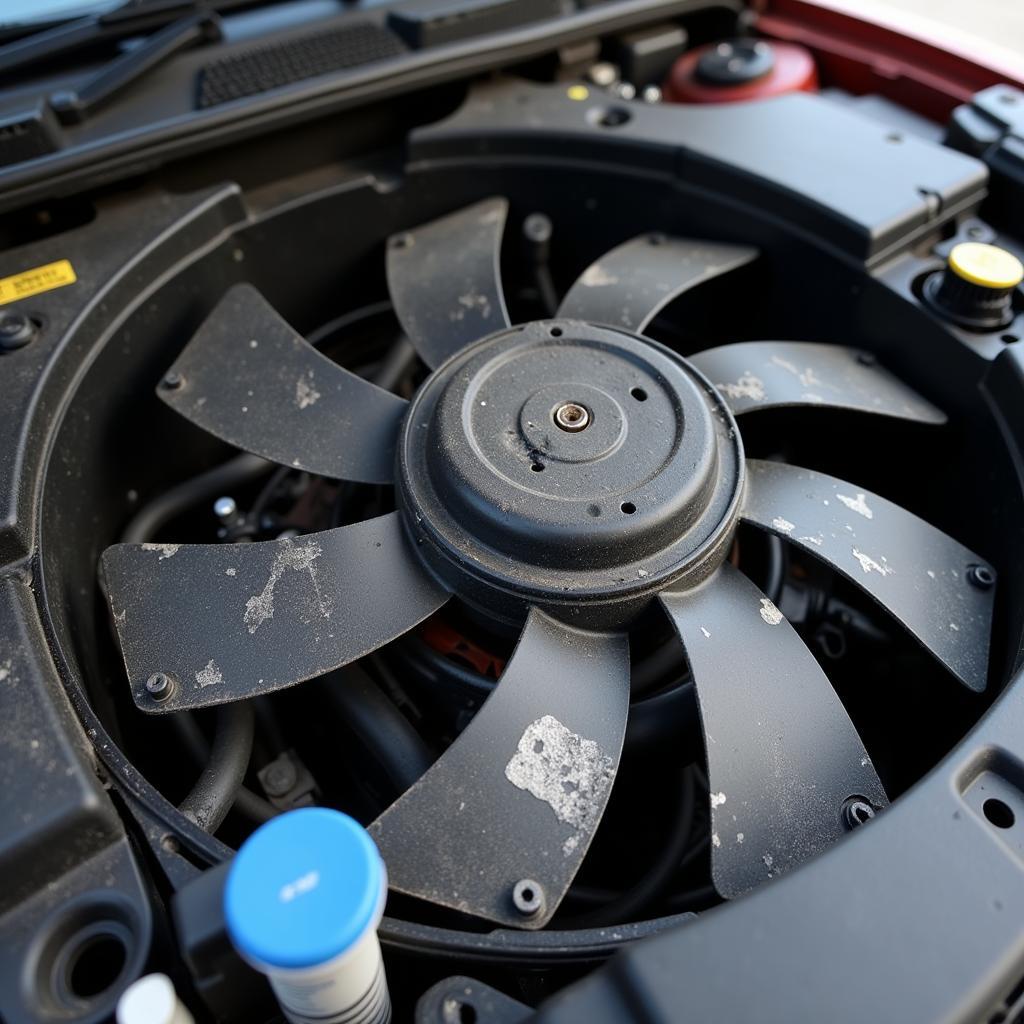Overheating is a common car problem that can lead to serious engine damage if left unchecked. Understanding Common Overheat Problems Car, their causes, and solutions can save you costly repairs and keep your vehicle running smoothly. This guide delves into the intricacies of overheating, providing you with practical advice and expert insights.
What Causes Common Overheat Problems Car?
Several factors can contribute to common overheat problems car. From a simple leak in the cooling system to a more complex issue like a blown head gasket, identifying the root cause is crucial.
Low Coolant Level
One of the most frequent causes of overheating is a low coolant level. This can be due to a leak in the radiator, hoses, water pump, or even a leak within the engine itself. Regularly checking your coolant level is essential preventative maintenance.
 Car Radiator with Low Coolant Level
Car Radiator with Low Coolant Level
Faulty Thermostat
The thermostat regulates the flow of coolant through the engine. A stuck closed thermostat prevents coolant from circulating, causing the engine to overheat. Conversely, a stuck open thermostat can prevent the engine from reaching optimal operating temperature, affecting performance and fuel efficiency.
Cooling Fan Malfunction
The cooling fan draws air through the radiator to dissipate heat. If the fan isn’t working correctly, whether due to a faulty fan motor, relay, or sensor, the engine can quickly overheat, especially at low speeds or when idling.
 Broken Cooling Fan in Car Engine
Broken Cooling Fan in Car Engine
Leaky or Clogged Radiator
A leaky radiator can lead to a loss of coolant, while a clogged radiator restricts coolant flow. Both situations can cause overheating. Rust, debris, and mineral buildup can clog the radiator, reducing its efficiency.
Bad Water Pump
The water pump circulates coolant throughout the engine. A failing water pump can’t effectively circulate coolant, leading to overheating. Signs of a bad water pump include leaking coolant, a whining noise from the pump, and overheating.
Blown Head Gasket
A blown head gasket is a serious issue that allows coolant to leak into the combustion chambers or oil passages. This can lead to overheating, white smoke from the exhaust, and milky oil. Repairing a blown head gasket is a complex and costly repair.
How to Troubleshoot Common Overheat Problems Car?
When you notice your car overheating, it’s important to take immediate action to prevent further damage.
- Pull over safely: Find a safe place to pull over and turn off the engine.
- Let the engine cool: Do not attempt to open the radiator cap while the engine is hot. Allow the engine to cool down completely before proceeding.
- Check the coolant level: Once the engine is cool, carefully check the coolant level in the overflow reservoir. If it’s low, add coolant if available.
- Inspect for leaks: Look for any signs of coolant leaks around the radiator, hoses, and water pump.
- Check the cooling fan: Check if the cooling fan is operating when the engine is running.
Common Overheat Problems Car: Expert Advice
“Regular maintenance is key to preventing overheating issues,” says John Smith, a certified automotive engineer with over 20 years of experience. “Simple checks like monitoring the coolant level and inspecting hoses can save you from costly repairs down the line.”
“Don’t ignore the warning signs,” adds Emily Johnson, a senior technician at a leading auto repair shop. “If your temperature gauge starts creeping up, address the issue promptly. Ignoring it could lead to a blown head gasket or other major engine damage.”
Conclusion
Common overheat problems car can range from minor inconveniences to major engine failures. Understanding the causes and taking preventative measures can keep your car running smoothly and prevent costly repairs. By staying proactive and addressing any signs of overheating promptly, you can prolong the life of your engine and ensure a safe and reliable driving experience. For personalized assistance and expert advice on your specific car overheating issue, contact AutoTipPro at +1 (641) 206-8880 or visit our office at 500 N St Mary’s St, San Antonio, TX 78205, United States.
FAQ
- What is the most common cause of car overheating? Low coolant levels are the most common culprit.
- Can I drive my car if it’s overheating? No, continuing to drive an overheating car can cause serious engine damage.
- How often should I check my coolant level? It’s recommended to check your coolant level at least once a month.
- How can I prevent my car from overheating? Regular maintenance, including coolant flushes and hose inspections, can help prevent overheating.
- What should I do if my car overheats while driving? Pull over safely, turn off the engine, and let it cool down before checking the coolant level.
- Is it safe to open the radiator cap when the engine is hot? No, never open the radiator cap when the engine is hot, as scalding hot coolant can spray out.
- How much does it cost to fix an overheating problem? The cost varies depending on the underlying cause, ranging from a simple coolant top-up to a costly head gasket repair.




Leave a Reply